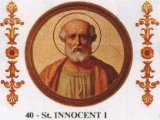
Pope Innocent I
Encyclopedia
Biography
He was, according to his biographer in the Liber PontificalisLiber Pontificalis
The Liber Pontificalis is a book of biographies of popes from Saint Peter until the 15th century. The original publication of the Liber Pontificalis stopped with Pope Adrian II or Pope Stephen V , but it was later supplemented in a different style until Pope Eugene IV and then Pope Pius II...
, the son of a man called Innocens of Albano
Albano Laziale
Albano Laziale is a comune in the province of Rome, on the Alban Hills, in Latium, central Italy. It is also a suburb of Rome, which is 25 km distant. It is bounded by other communes of Castel Gandolfo, Rocca di Papa, Ariccia and Ardea. Located in the Castelli Romani area of Lazio...
; but according to his contemporary Jerome
Jerome
Saint Jerome was a Roman Christian priest, confessor, theologian and historian, and who became a Doctor of the Church. He was the son of Eusebius, of the city of Stridon, which was on the border of Dalmatia and Pannonia...
, his father was Pope Anastasius I
Pope Anastasius I
Pope Saint Anastasius I, born in Rome the son of Maximus, was pope from November 27, 399 to 401.He condemned the writings of the Alexandrian theologian Origen shortly after their translation into Latin. He fought against these writings throughout his papacy and in 400 he called a council to discuss...
(399–401), whom he was called by the unanimous voice of the clergy and laity to succeed (he had been born before his father's entry to the clergy, let alone the papacy; this was before the time of a rule of celibacy
Celibacy
Celibacy is a personal commitment to avoiding sexual relations, in particular a vow from marriage. Typically celibacy involves avoiding all romantic relationships of any kind. An individual may choose celibacy for religious reasons, such as is the case for priests in some religions, for reasons of...
for priests).
Innocent I lost no opportunity of maintaining and extending the authority of the Roman see as the ultimate resort for the settlement of all disputes; and his still extant communications with Victricius of Rouen, Exuperius of Toulouse, Alexander of Antioch and others, as well as his actions on the appeal made to him by John Chrysostom
John Chrysostom
John Chrysostom , Archbishop of Constantinople, was an important Early Church Father. He is known for his eloquence in preaching and public speaking, his denunciation of abuse of authority by both ecclesiastical and political leaders, the Divine Liturgy of St. John Chrysostom, and his ascetic...
(397–403) against Theophilus of Alexandria
Theophilus of Alexandria
Theophilus of Alexandria was Patriarch of Alexandria, Egypt, from 385 to 412. He is regarded as a saint by the Coptic Orthodox Church....
, show that opportunities of the kind were numerous and varied. He took a decided view on the Pelagian
Pelagius
Pelagius was an ascetic who denied the need for divine aid in performing good works. For him, the only grace necessary was the declaration of the law; humans were not wounded by Adam's sin and were perfectly able to fulfill the law apart from any divine aid...
controversy, confirming the decisions of the synod of the province of proconsular Africa
Africa
Africa is the world's second largest and second most populous continent, after Asia. At about 30.2 million km² including adjacent islands, it covers 6% of the Earth's total surface area and 20.4% of the total land area...
, held in Carthage
Carthage
Carthage , implying it was a 'new Tyre') is a major urban centre that has existed for nearly 3,000 years on the Gulf of Tunis, developing from a Phoenician colony of the 1st millennium BC...
in 416, which had been sent to him, and also writing in the same year in a similar sense to the fathers of the Numidia
Numidia
Numidia was an ancient Berber kingdom in part of present-day Eastern Algeria and Western Tunisia in North Africa. It is known today as the Chawi-land, the land of the Chawi people , the direct descendants of the historical Numidians or the Massyles The kingdom began as a sovereign state and later...
n synod of Mileve who, Augustine
Augustine of Hippo
Augustine of Hippo , also known as Augustine, St. Augustine, St. Austin, St. Augoustinos, Blessed Augustine, or St. Augustine the Blessed, was Bishop of Hippo Regius . He was a Latin-speaking philosopher and theologian who lived in the Roman Africa Province...
being one of their number, had addressed him.
The historian Zosimus in his Historia Nova suggests that during the sack of Rome in 410 by Alaric that Innocent I was willing to permit private pagan practices as a temporary measure. However, Zosimus also suggests that this attempt by pagans to restore public worship failed due to lack of public interest, suggesting that Rome had been successfully Christianized in the last century.
Among Innocent I's letters is one to Jerome and another to John II, Bishop of Jerusalem, regarding annoyances to which the former had been subjected by the Pelagians at Bethlehem
Bethlehem
Bethlehem is a Palestinian city in the central West Bank of the Jordan River, near Israel and approximately south of Jerusalem, with a population of about 30,000 people. It is the capital of the Bethlehem Governorate of the Palestinian National Authority and a hub of Palestinian culture and tourism...
. He died on March 12, 417. Accordingly, though from the thirteenth to the twentieth century he was commemorated on 28 July, his feast day is now March 12. His successor was Zosimus
Pope Zosimus
Pope Saint Zosimus was Pope from March 18, 417 to December 26, 418 .He succeeded Innocent I, and was followed by Boniface I. Zosimus took a decided part in the protracted dispute in Gaul as to the jurisdiction of the see of Arles over that of Vienne, giving energetic decisions in favour of the...
.

